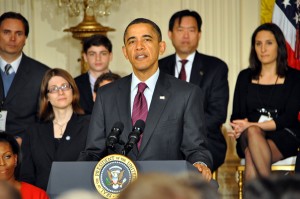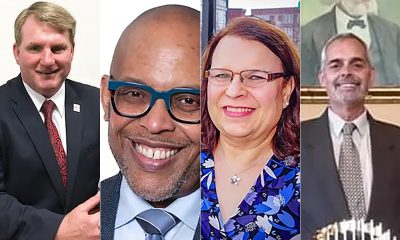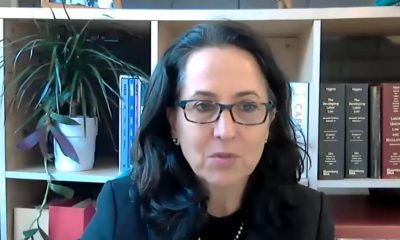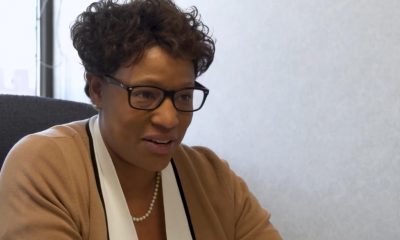National
Gay staffers take key roles in Obama campaign
From finance to digital initiatives, supporters working to win second term

[Editor’s note: This is the first of a two-part series.]
Engaging in tasks from fundraising to digital initiatives to public outreach, President Obama’s re-election campaign staff is already hard at work helping to secure a second term in the White House — and many members of the LGBT community have high-profile roles in that effort.
The Washington Blade interviewed four gay and lesbian staffers who are working to re-elect Obama from the campaign headquarters in Chicago. This article is the first in a two-part series and features interviews with two of the campaign workers: Rufus Gifford, the finance director, and Teddy Goff, the digital director.

President Obama’s campaign staff includes several high-profile gay members. (Blade file photo by Michael Key)
For Gifford, who’s gay, seeing Obama serve another two years in office is important because he believes the administration so far has been “two of the most productive years in American history.”
“I’ve been on board with the campaign in one way shape or form since January 2007 — nearly from the moment I met Sen. Obama,” Gifford said. “I was certainly a believer in him and his message and his politics, etc. So, I do believe that the last two years have been two of the very most productive years in American history. In my mind, truly, if we can get four more, think of how much more we can accomplish.”
Gifford said Obama’s accomplishments for the LGBT community — most notably “Don’t Ask, Don’t Tell” repeal — are “obviously very, very personally important” to him. Still, Gifford also counts among the president’s victories passage of the economic stimulus plan and health care reform as well as ratification of the START Treaty, a nuclear-arms reduction agreement.
As finance director, Gifford overseas the funds raised for both the Obama campaign as well as a joint committee that raises funds between the campaign and the Democratic National Committee. It’s similar to his role as finance director of the DNC, which he occupied immediately before joining the Obama campaign, and his role in raising money for Obama in California during the 2008 campaign.
“Every morning I start the day with a 9 a.m. senior staff meeting with the campaign leadership,” Gifford said. “I am a huge believer that finance should never be siloed within a campaign.”
Gifford said he believes the campaign will be stronger and raise more money if he’s talking to the directors of the field department, the digital department, the tech department and the communications department.
In the second quarter, fundraising for the Obama campaign beat expectations. Obama raised more than $86 million for his re-election campaign and the Democratic National Committee, which far outpaced Republican candidates seeking to oust him from the White House.
The third quarter numbers are yet to be made public. Media reports state that the campaign is expecting to rake in less cash because the president had to cancel fundraisers to attend debt ceiling negotiations with congressional leaders.
One difference that Gifford faces working with the Obama campaign in 2012 as opposed to his work in 2008 is the fact that he’s now separated from his partner, Jeremy Bernard, who serves as the White House social secretary.
In 2008, Gifford and Bernard were featured in numerous media outlets as a gay power couple and were named in Out magazine’s listing of the Top 50 power gays.
Gifford declined to comment on his separation from Bernard, but confirmed the couple split in 2009. Gifford’s current partner resides in D.C.
While Gifford manages fundraising for the Obama campaign, another gay member of the president’s re-election team, Goff, handles digital outreach efforts.
As digital director, Goff runs Internet communications for the campaign, which includes outreach via e-mail or social networking sites like Twitter and Facebook.
“Our job in the digital department is to talk to millions of Twitter followers, millions of e-mail subscribers, millions of Facebook fans everyday, and that’s a viewpoint that I think is helpful even in helping shape and inform broader discussions about how we talk to people and how we build,” Goff said.
Goff, who’s 26 and gay, comes to the Obama campaign after his most immediate position working with Blue State Digital, a digital agency in New York. In 2008, Goff ran digital programs at the state level for the Obama campaign.
Goff’s commitment to see Obama re-elected stems from the president’s record over the course of two-and-a-half years in office, which Goff said is “without parallel in my lifetime or even my parents’ lifetime.”
“So for me, he’s every bit as inspiring and compelling a figure as I ever thought he was.”
The main priority for 2011, Goff said, is making sure existing Obama supporters have avenues to make their voices heard.
What’s the best online platform for the Obama campaign to connect with its supporters? Goff said “everybody’s different” in the way they want to interact.
“There may be one person who wants to hear from us via e-mail, and another person who wants to hear from us on Twitter, but our point of view is that isn’t so much what matters,” Goff said. “Most things come and go. This time, four years ago, Myspace was a really big deal. Now people aren’t talking about that so much anymore. The perspective that we try to bring to it is what’s the basic content that’s going to engage people, how can we shape a relationship that’s going to make them feel engaged and feel like a part of the family.”
But the fight to re-elect Obama in 2012 could be more of a challenge than it was making sure he won the White House in 2008. Recent polls have placed Obama’s approval rating at its lowest point during the course of his term. A few weeks ago, Gallup found that Obama’s approval rating was at 39 percent, marking the first time his approval rating had dipped below 40 percent.
Gifford said he’s not in a position to say whether a win for Obama will be more challenging than it was in 2008, but asserted supporters will push on in the effort to claim victory.
Similarly, Goff said he doesn’t know if winning the White House will be more challenging for Obama in 2012, but said he expects the commitment of campaign workers would lead the president to victory.
The support that Obama will receive from the LGBT community in his re-election efforts remains to be seen. Significant milestones in LGBT rights occurred under his watch — most notably the passage of hate crimes legislation and repeal of “Don’t Ask, Don’t Tell.” Obama also received praise earlier this year for dropping the administration’s legal defense of the Defense of Marriage Act in court.
But other actions sought by the LGBT community remain outstanding — such as the enactment of employment protections based on sexual orientation and gender identity. The president’s lack of support for same-sex marriage riles some in the LGBT community as the fight to win marriage equality continues throughout the states.
Gifford said he’d tell anyone who says Obama hasn’t done enough on LGBT issues during his first term in office that “you cannot make the argument that this is not the most pro-gay administration in history.”
How can other LGBT people help who want to see Obama re-elected in 2012? Goff said those who are interested should check out the campaign website or participate in an on-the-ground field program that is being built in communities across the country.
“There are things for people who want to be involved only or primarily in LGBT issues,” Goff said. “We should have LGBT people do that, but also hope that LGBT people will get involved in the broad program and organize their community just like anybody else.”
Federal Government
Lambda Legal praises Biden-Harris administration’s finalized Title IX regulations
New rules to take effect Aug. 1

The Biden-Harris administration’s revised Title IX policy “protects LGBTQ+ students from discrimination and other abuse,” Lambda Legal said in a statement praising the U.S. Department of Education’s issuance of the final rule on Friday.
Slated to take effect on Aug. 1, the new regulations constitute an expansion of the 1972 Title IX civil rights law, which prohibits sex-based discrimination in education programs that receive federal funding.
Pursuant to the U.S. Supreme Court’s ruling in the landmark 2020 Bostock v. Clayton County case, the department’s revised policy clarifies that discrimination on the basis of sexual orientation and gender identity constitutes sex-based discrimination as defined under the law.
“These regulations make it crystal clear that everyone can access schools that are safe, welcoming and that respect their rights,” Education Secretary Miguel Cardona said during a call with reporters on Thursday.
While the new rule does not provide guidance on whether schools must allow transgender students to play on sports teams corresponding with their gender identity to comply with Title IX, the question is addressed in a separate rule proposed by the agency in April.
The administration’s new policy also reverses some Trump-era Title IX rules governing how schools must respond to reports of sexual harassment and sexual assault, which were widely seen as imbalanced in favor of the accused.
Jennifer Klein, the director of the White House Gender Policy Council, said during Thursday’s call that the department sought to strike a balance with respect to these issues, “reaffirming our longstanding commitment to fundamental fairness.”
“We applaud the Biden administration’s action to rescind the legally unsound, cruel, and dangerous sexual harassment and assault rule of the previous administration,” Lambda Legal Nonbinary and Transgender Rights Project Director Sasha Buchert said in the group’s statement on Friday.
“Today’s rule instead appropriately underscores that Title IX’s civil rights protections clearly cover LGBTQ+ students, as well as survivors and pregnant and parenting students across race and gender identity,” she said. “Schools must be places where students can learn and thrive free of harassment, discrimination, and other abuse.”
Michigan
Mich. Democrats spar over LGBTQ-inclusive hate crimes law
Lawmakers disagree on just what kind of statute to pass

Michigan could soon become the latest state to pass an LGBTQ-inclusive hate crime law, but the state’s Democratic lawmakers disagree on just what kind of law they should pass.
Currently, Michigan’s Ethnic Intimidation Act only offers limited protections to victims of crime motivated by their “race, color, religion, gender, or national origin.” Bills proposed by Democratic lawmakers expand the list to include “actual or perceived race, color, religion, gender, sexual orientation, gender identity or expression, ethnicity, physical or mental disability, age, national origin, or association or affiliation with any such individuals.”
Democratic Gov. Gretchen Whitmer and Attorney General Dana Nessel have both advocated for a hate crime law, but house and senate Democrats have each passed different hate crimes packages, and Nessel has blasted both as being too weak.
Under the house proposal that passed last year (House Bill 4474), a first offense would be punishable with a $2,000 fine, up to two years in prison, or both. Penalties double for a second offense, and if a gun or other dangerous weapons is involved, the maximum penalty is six years in prison and a fine of $7,500.
But that proposal stalled when it reached the senate, after far-right news outlets and Fox News reported misinformation that the bill only protected LGBTQ people and would make misgendering a trans person a crime. State Rep. Noah Arbit, the bill’s sponsor, was also made the subject of a recall effort, which ultimately failed.
Arbit submitted a new version of the bill (House Bill 5288) that added sections clarifying that misgendering a person, “intentionally or unintentionally” is not a hate crime, although the latest version (House Bill 5400) of the bill omits this language.
That bill has since stalled in a house committee, in part because the Democrats lost their house majority last November, when two Democratic representatives resigned after being elected mayors. The Democrats regained their house majority last night by winning two special elections.
Meanwhile, the senate passed a different package of hate crime bills sponsored by state Sen. Sylvia Santana (Senate Bill 600) in March that includes much lighter sentences, as well as a clause ensuring that misgendering a person is not a hate crime.
Under the senate bill, if the first offense is only a threat, it would be a misdemeanor punishable by one year in prison and up to $1,000 fine. A subsequent offense or first violent hate crime, including stalking, would be a felony that attracts double the punishment.
Multiple calls and emails from the Washington Blade to both Arbit and Santana requesting comment on the bills for this story went unanswered.
The attorney general’s office sent a statement to the Blade supporting stronger hate crime legislation.
“As a career prosecutor, [Nessel] has seen firsthand how the state’s weak Ethnic Intimidation Act (not updated since the late 1980’s) does not allow for meaningful law enforcement and court intervention before threats become violent and deadly, nor does it consider significant bases for bias. It is our hope that the legislature will pass robust, much-needed updates to this statute,” the statement says.
But Nessel, who has herself been the victim of racially motivated threats, has also blasted all of the bills presented by Democrats as not going far enough.
“Two years is nothing … Why not just give them a parking ticket?” Nessel told Bridge Michigan.
Nessel blames a bizarre alliance far-right and far-left forces that have doomed tougher laws.
“You have this confluence of forces on the far right … this insistence that the First Amendment protects this language, or that the Second Amendment protects the ability to possess firearms under almost any and all circumstances,” Nessel said. “But then you also have the far left that argues basically no one should go to jail or prison for any offense ever.”
The legislature did manage to pass an “institutional desecration” law last year that penalizes hate-motivated vandalism to churches, schools, museums, and community centers, and is LGBTQ-inclusive.
According to data from the U.S. Department of Justice, reported hate crime incidents have been skyrocketing, with attacks motivated by sexual orientation surging by 70 percent from 2020 to 2022, the last year for which data is available.
Twenty-two states, D.C., Puerto Rico, and the U.S. Virgin Islands have passed LGBTQ-inclusive hate crime laws. Another 11 states have hate crime laws that include protections for “sexual orientation” but not “gender identity.”
Michigan Democrats have advanced several key LGBTQ rights priorities since they took unified control of the legislature in 2023. A long-stalled comprehensive anti-discrimination law was passed last year, as did a conversion therapy ban. Last month the legislature updated family law to make surrogacy easier for all couples, including same-sex couples.
A bill to ban the “gay panic” defense has passed the state house and was due for a Senate committee hearing on Wednesday.
Indiana
Drag queen announces run for mayor of Ind. city
Branden Blaettne seeking Fort Wayne’s top office

In a Facebook post Tuesday, a local drag personality announced he was running for the office of mayor once held by the late Fort Wayne Mayor Tom Henry, who died last month just a few months into his fifth term.
Henry was recently diagnosed with late-stage stomach cancer and experienced an emergency that landed him in hospice care. He died shortly after.
WPTA, a local television station, reported that Fort Wayne resident Branden Blaettne, whose drag name is Della Licious, confirmed he filed paperwork to be one of the candidates seeking to finish out the fifth term of the late mayor.
Blaettner, who is a community organizer, told WPTA he doesn’t want to “get Fort Wayne back on track,” but rather keep the momentum started by Henry going while giving a platform to the disenfranchised groups in the community. Blaettner said he doesn’t think his local fame as a drag queen will hold him back.
“It’s easy to have a platform when you wear platform heels,” Blaettner told WPTA. “The status quo has left a lot of people out in the cold — both figuratively and literally,” Blaettner added.

The Indiana Capital Chronicle reported that state Rep. Phil GiaQuinta, who has led the Indiana House Democratic caucus since 2018, has added his name to a growing list of Fort Wayne politicos who want to be the city’s next mayor. A caucus of precinct committee persons will choose the new mayor.
According to the Fort Wayne Journal Gazette, the deadline for residents to file candidacy was 10:30 a.m. on Wednesday. A town hall with the candidates is scheduled for 6 p.m. on Thursday at Franklin School Park. The caucus is set for 10:30 a.m. on April 20 at the Lincoln Financial Event Center at Parkview Field.
At least six candidates so far have announced they will run in the caucus. They include Branden Blaettne, GiaQuinta, City Councilwoman Michelle Chambers, City Councilwoman Sharon Tucker, former city- and county-council candidate Palermo Galindo, and 2023 Democratic primary mayoral candidate Jorge Fernandez.
-

 District of Columbia2 days ago
District of Columbia2 days agoReenactment of first gay rights picket at White House draws interest of tourists
-

 District of Columbia2 days ago
District of Columbia2 days agoNew D.C. LGBTQ+ bar Crush set to open April 19
-

 Arizona2 days ago
Arizona2 days agoAriz. governor vetoes anti-transgender, Ten Commandments bill
-

 Africa4 days ago
Africa4 days agoUgandan activists appeal ruling that upheld Anti-Homosexuality Act












